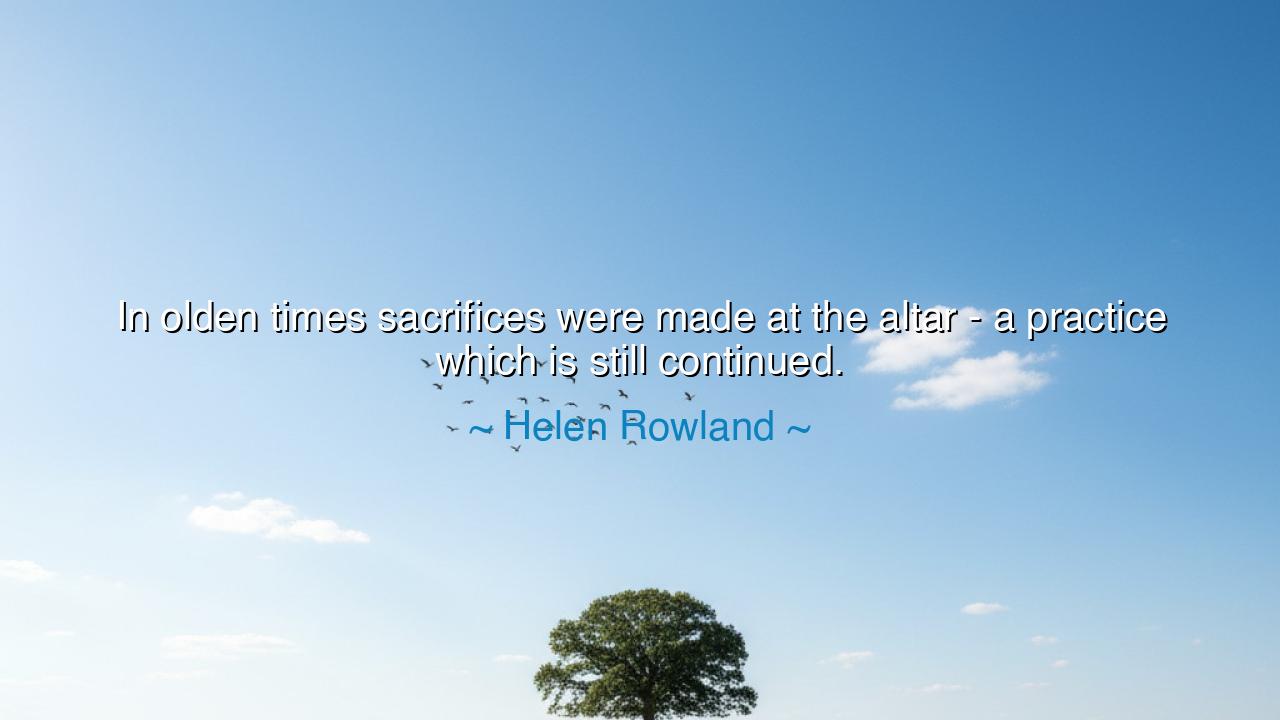
In olden times sacrifices were made at the altar - a practice
In olden times sacrifices were made at the altar - a practice which is still continued.






The words of Helen Rowland, veiled in wit yet sharpened with truth, pierce the heart of an ancient paradox: “In olden times sacrifices were made at the altar — a practice which is still continued.”
On the surface, her remark dances with humor, but beneath that laughter lies a timeless reflection on love, marriage, and the nature of human devotion. For though the temples of stone may have fallen, and the smoke of burnt offerings long since vanished from the air, the altar of sacrifice has not disappeared — it has only changed its form. In her irony, Rowland speaks of the altar of marriage, where countless souls still offer their freedom, their pride, and sometimes their joy, in pursuit of companionship or social expectation. Her words remind us that every bond, whether sacred or human, demands a price.
Helen Rowland, a columnist and humorist of the early twentieth century, was known for her piercing observations on the war between the sexes — a war waged not with swords, but with sighs, hopes, and expectations. Living in an age when women were awakening to new independence, she used wit to reveal truths too uncomfortable to say plainly. Her remark, though jesting, reflects the ancient continuity of human nature: that wherever love or faith promises transcendence, there too lurks the shadow of surrender. The altar — once a place of worship to gods — had become, in her eyes, the symbol of marriage itself, where one lays down pieces of the self in the name of union.
In the ancient world, sacrifice was an act of devotion — a ritual exchange between mortals and the divine. The Greeks, the Hebrews, the Aztecs, all believed that to receive favor from heaven, something precious must be offered: a lamb, a harvest, a life. So too, in Rowland’s modern metaphor, the marital altar demands its own offerings — not of blood, but of individuality, of desire, of dreams deferred. To love deeply is to give, to bend, to compromise. Yet Rowland’s tone carries a warning: that too often the giving becomes unequal, the offering becomes submission, and the sacred fire turns to smoke.
Consider the tale of Jane Welsh Carlyle, wife of the philosopher Thomas Carlyle. A brilliant woman in her own right, she devoted her life to her husband’s genius, tending his moods, shaping his words, and standing always in his shadow. She sacrificed her own voice at the altar of his ambition, believing her love to be noble and necessary. Only after her death did Thomas read her letters and realize what she had silently given — and what he had unknowingly taken. Her story stands as both tribute and caution: that love which demands too much of one soul ceases to be a partnership and becomes instead a quiet martyrdom. Such is the sacrifice still continued.
Rowland’s humor, therefore, conceals not cynicism, but clarity. She does not mock love itself, but the illusions that surround it — the belief that to give everything is proof of virtue, or that self-denial is the highest form of devotion. In truth, love, when pure, does not demand destruction; it asks for balance. It is not the altar of fire and loss, but the table of sharing and nourishment. Yet, in her age and ours, many still mistake sacrifice for love, confusing endurance with harmony. Her words remind us that true union should elevate both souls, not consume one for the comfort of the other.
From this, my child, learn the wisdom of discernment. All love requires offering, yes — time, patience, vulnerability — but it must never require the surrender of self. If you kneel at the altar of commitment, bring your gifts freely, not as tribute demanded by fear or expectation. Keep your flame alive even as you share its warmth, for a love that devours individuality becomes a tomb, not a temple. The gods of old demanded sacrifice to maintain their power; the love of today must learn to nurture without domination.
So let Helen Rowland’s jest echo as a lesson for the ages: laughter may cloak it, but truth burns beneath. The altar remains — in every marriage, friendship, and cause — but wisdom lies in choosing what to sacrifice. Do not offer your freedom for comfort, nor your spirit for approval. Offer instead your compassion, your patience, your honest self. For when sacrifice is guided by love and not fear, the altar is no longer a place of loss, but of renewal — where two souls, standing equal, light a single flame that warms without consuming.






AAdministratorAdministrator
Welcome, honored guests. Please leave a comment, we will respond soon